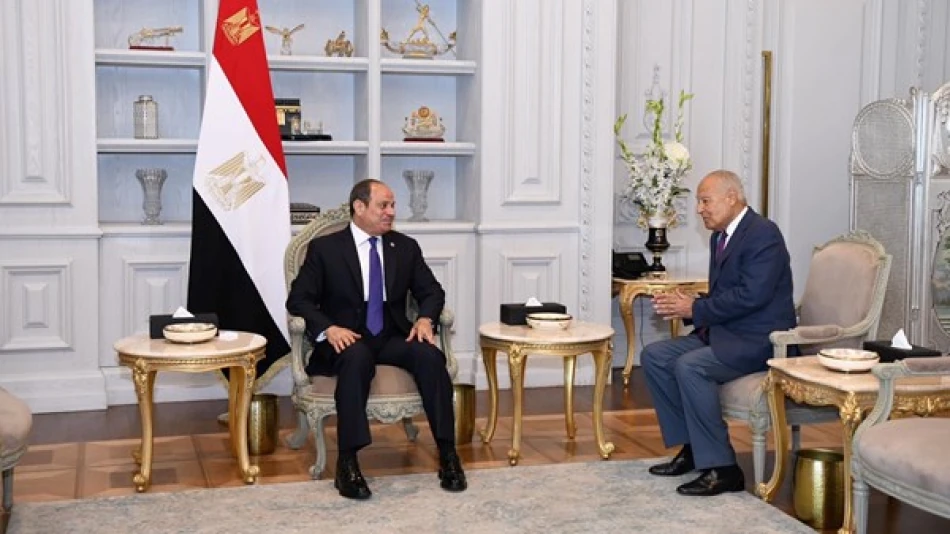
Egyptian President Discusses Latest Arab Issues with Arab League
Egypt and Arab League Reinforce Regional Diplomacy Amid Gaza Crisis and Middle East Instability
Egyptian President Abdel Fattah el-Sisi and Arab League Secretary-General Ahmed Aboul Gheit held strategic talks Sunday to coordinate regional responses to escalating crises across the Middle East, with Gaza's humanitarian catastrophe taking center stage. The high-level meeting underscores Egypt's growing role as a diplomatic anchor in an increasingly fragmented Arab world, while highlighting the Arab League's renewed relevance in crisis management.
Gaza Takes Priority in Regional Diplomacy
The discussions centered heavily on developments in Gaza and the West Bank, with both leaders reviewing Egypt and Qatar's intensive mediation efforts to secure a ceasefire and ensure humanitarian aid reaches Palestinian civilians. According to Egyptian presidential spokesman Mohamed el-Shenawy, the talks emphasized pursuing a "just and comprehensive settlement" to the Palestinian issue through establishing an independent Palestinian state based on international legal frameworks.
This positioning reflects Egypt's calculated strategy to maintain its historical role as a key Middle East broker while managing its own security concerns along the Gaza border. Egypt's coordination with Qatar—despite their past diplomatic tensions—signals a pragmatic approach to crisis management that prioritizes regional stability over bilateral grievances.
Broader Regional Challenges Under Review
Syria and Libya: Persistent Instability
The meeting also addressed ongoing developments in Syria and Libya, focusing on efforts to restore security and stability in both conflict-torn nations. These discussions come as both countries remain fragmented by competing factions and foreign interventions, with Syria's Assad regime maintaining tenuous control and Libya still divided between rival governments.
Egypt's involvement in both theaters reflects its broader security doctrine of preventing state collapse on its borders—a lesson learned from the chaos that followed the 2011 Arab Spring.
Horn of Africa and Red Sea Security
The leaders examined security and political conditions in the Horn of Africa and Red Sea maritime security—a critical concern given that approximately 12% of global trade passes through this waterway. Recent attacks on commercial shipping have elevated these waters to a top priority for regional powers and international stakeholders alike.
Egypt's Strategic Positioning
President Sisi reaffirmed Egypt's "steadfast commitment" to supporting the Arab League, emphasizing Cairo's belief in the organization's central role in strengthening joint Arab action and unifying Arab ranks against regional challenges. This public endorsement carries significant weight given Egypt's size, military capabilities, and geographic position connecting Africa, Asia, and the Middle East.
The Arab League chief praised Egypt's "wise positions" in contributing to regional security and stability, particularly through supporting a just and final solution to the Palestinian issue as the "only path to ensuring lasting and comprehensive peace in the region."
Implications for Regional Order
This diplomatic engagement reflects a broader recalibration of Arab politics, where traditional powerhouses like Egypt and Saudi Arabia are reasserting leadership roles while newer players like the UAE maintain their influence through economic leverage. The coordination between Egypt and the Arab League suggests an attempt to revitalize multilateral Arab diplomacy after years of bilateral deal-making and normalization agreements that bypassed collective Arab positions.
For international observers, Egypt's diplomatic activism signals its determination to remain central to any regional settlement, particularly regarding Palestine—a position that could complicate or complement broader international mediation efforts depending on how well Cairo coordinates with global powers.
Most Viewed News

 Layla Al Mansoori
Layla Al Mansoori






